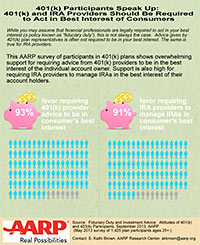Staying Fit
AARP has fought for decades to protect workers' retirement savings from fraudulent, deceptive and misleading practices that threaten the retirement security of millions of Americans.
AARP Fiduciary Duty Report
See the full AARP Research report "Fiduciary Duty and Investment Advice: Attitudes of 401(k) and 403(b) Participants" and full-page version of the infographic pictured above.


With the shift away from traditional pensions to 401(k)-style plans, more and more people are on their own when it comes to making important decisions about their retirement savings. Since the choices can be complicated, many individuals and employers turn to investment professionals for help.


AARP Membership— $12 for your first year when you sign up for Automatic Renewal
Get instant access to members-only products and hundreds of discounts, a free second membership, and a subscription to AARP the Magazine.
Today, workers and retirees increasingly rely on advice from people who aren't subject to federal laws requiring them to protect their clients, and who aren't required to disclose any inherent financial conflicts of interest.
AARP strongly believes that investment advice must be objective, follow sound investment principles and be based on what is in the best interest of the individual consumer. We are calling for the highest standards to apply to any investment advice.
The U.S. Department of Labor is considering ways to update and strengthen regulations to better protect American workers and their retirement nest eggs from financial conflicts of interest. Under rules governing 401(k)-type retirement plans, some providers offering advice to individual participants may earn money based on the individual's investment selections — and they do not have to disclose this fact to the client.

































































More on politics-society
How to Find the Best Health Care in a Post-Pandemic World
Discover the tools you need to find the right doctor, surgeon and hospital for you